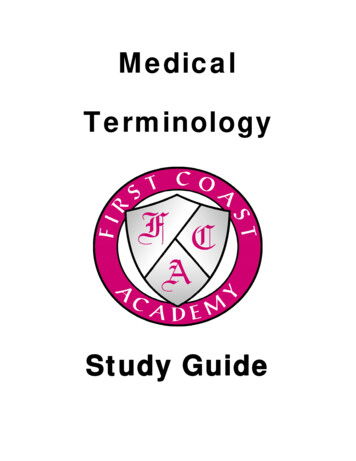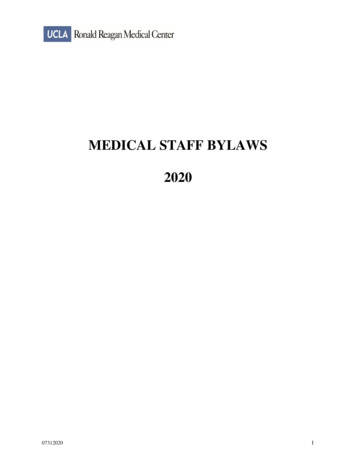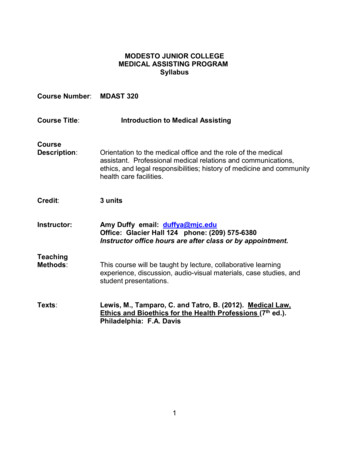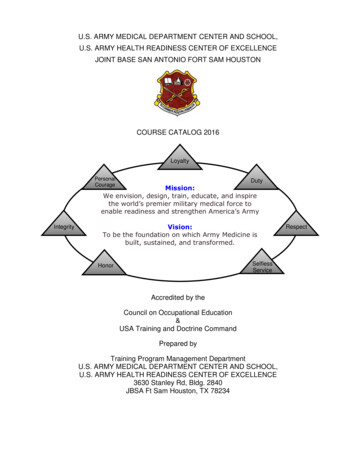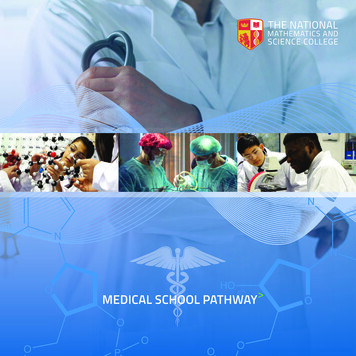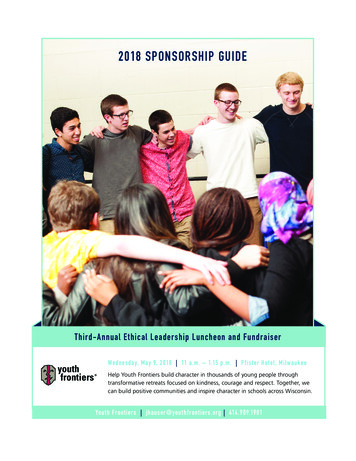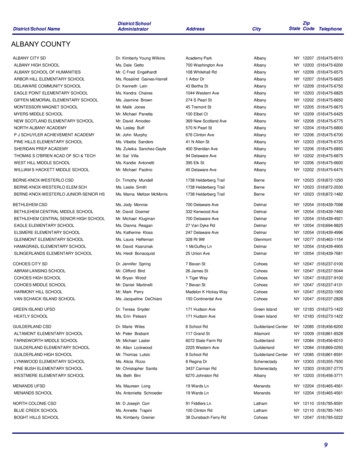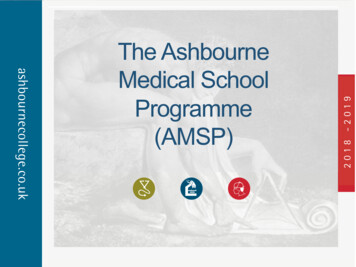
Transcription
;H%2 020161 8 –-20172019ashbournecollege.co.ukThe AshbourneMedicalSchoolTheAshbourneProgrammeMedical School(AMSP)Program (AMSP)
Amy YoungmanHead of the Medical ProgrammeAmy only joined Ashbourne inSeptember 2015 but has spent thelast seven years working withmedical students, guiding themthrough the application process.She is Head of faculty for theNatural Sciences and teachesbiology in addition to running themedical programme.Amy runs the medical sessions eachweek, and will be the first point ofcontact for all students wishing toapply to medical school.By having a member of staffdedicated to all medicalstudents, it ensures eachstudent receives individualattention and assurance thatthey are supported throughoutthe entire application process.Amy is also an interviewer forUCL Medical School.
Students will be provided with: A thorough understanding of what a medical career will involve BMAT and UKCAT preparation Interview preparation: both traditional and MMI’s UCAS help: The personal statement and how to know where toapply Assistance in securing work experience placements The opportunity to discuss medical ethics and current medicalissues with other prospective medial students during weeklymeetings The opportunity to talk to current doctors and Ashbournealumni who are now at medical school
Can the AMSP help studentsconsidering Dentistry? Yes! Although less common, we stillget a small handful of studentswishing to apply for dentistryeach year. These students will attend all theAMSP sessions and will also needto keep up to date with what isgoing on in the world ofdentistry. This year we have had 3 studentsapply for dentistry
StatisticsSource: UCAS (Number of applicants in the 2014-2015 academic year)Successfulapplicants(%)Type ofapplicantNumber ofapplicantsApplicantsaccepted ontodegree AL84,8507,6809.05
Why are so many applicantsunsuccessful? BMAT/UKCAT scores maynot be high enough Not enough workexperience A poor interview Weak personal statement Applying to the wronguniversities Lack of extracurricularactivities
ashbournecollege.co.ukOne does not simply‘get accepted’ toMedical School;H%
How can the Ashbourne MedicalSchool Programme help? By attending weekly sessions,in addition to the MedicalEaster Revision course,students will be provided withall the information necessaryfor a successful application. All potential medical studentsare identified when theyinterview at Ashbourne. Thisensures that they are givenguidance right from the start. The AMSP guides studentsthrough the entire applicationprocess, from drafting thepersonal statement toaccepting an offer.
Weekly sessions%Hashbournecollege.co.uk;
Typical Timetablefor weekly sessionsWeek123456789101112Topics discussedIntroduction to MedicineHow to write a powerful Personal StatementWhere will the NHS be in 5 years’ time?How to decide which medical schools to apply toHow to secure work experienceBMAT preparationUKCAT preparationPrevious successful applicants: how did they do it?Advice from real doctorsThe Traditional Interview: typical questionsMultiple Mini Interviews (MMI’s): typical questionsThe 5th choice: how to make it wisely
The benefits of weeklysessions The weekly sessions givestudents the opportunity toimprove their non-academicskills.Debating current medicalissues allows students toconsider arguments from bothpoints of view.Presenting information aboutimportant topics such aseuthanasia or abortion alsoallows students to improvetheir public speaking.Ex-Ashers Antonio & Jiaming visitingthe AEP students
Work ExperienceWork experience isabsolutely essential. When to apply CRB check
VolunteeringIn addition to highacademic achievement,medical schools look forapplicants who aregenuinely concerned forothers. Some time spentvolunteering is not only agood way to enhance yourexperience, but it alsodemonstrates yourempathy and committedto a career in medicine.NHS consortium
Admissions Tests for Medicineashbournecollege.co.uk;H%
BMAT and UKCAT BMAT (Biomedical Admissions Test): The BMAT was introduced in2003 because the top institutions receive many more applications fromextremely well qualified students than there are places to offer. Thepurpose of the test is purely to provide a predictive assessment ofcandidate’s academic potential. UKCAT (UK Clinical Aptitude Test): It helps to ensure that candidatesselected have the most appropriate mental abilities, attitudes andprofessional behaviour required for new doctors and dentists to besuccessful in their clinical careers. It is used in collaboration with otheradmissions processes such as the UCAS application and academicqualifications. The UKCAT does not contain any curriculum or sciencecontent. It focuses on exploring the cognitive powers of candidatesand other attributes considered to be valuable for health careprofessionals.
BMAT: Sat at Ashbourne inNovemberSection 1:Aptitude andSkillsDuration: 1 hourNumber of Questions:35 multiple choice orshort answer questionsThis section tests thegeneric skills of problemsolving, understandingargument, data analysisand inference.g the personal statementto accepting an offer.Section 1:ScientificKnowledgeand ApplicationsDuration: 30 minutesNumber of questions:27 multiple choice orshort answer questionsThis section tests yourability to apply corescientific andmathematical knowledgeand principles (typicallycovered by the age of 16in non-specialist schoolscience and mathematicscourses).Section 3:Writing TaskDuration: 30 minutesNumber of Questions:one question must beanswered from a choiceof four.This section testswhether you candemonstrate thecapacity to develop ideasand communicate themeffectively in writing.
BMAT: Sat at Ashbourne in NovemberUNIVERSITYCOURSEBrighton and Sussex Medical School (B74)*A100 MedicineImperial College London (I50)A100 MedicineA109 Graduate Medicine (5 year course)Keele University (K12)A100 MedicineKeele requires only ‘overseas for fees’ applicants to A104 Health Foundation Yeartake BMAT.Lancaster University (L14)A100 Medicine & SurgeryA900 Foundation Year for Medicine & SurgeryLee Kong Chian School of Medicine (LKCMedicine) Medicine: MBBS degree jointly awarded byImperial College London and NanyangTechnological University, SingaporeUniversity College London (U80)A100 MedicineUniversity of Cambridge (C05)A100 MedicineUniversity of Leeds (L23)A100 MedicineA200 DentistryUniversity of Oxford (O33) A100 MedicineA101 Graduate MedicineBC98 Biomedical SciencesUniversidad de NavarraMedicine
UKCAT: Sat at an external centrebetween July and September
Academic RequirementsIt is no secret that the entry requirement for Medicine is high. Typical offers range from A*A*A to AAA. It is absolutely essential that students achieve all A grades atAS in order to guarantee that they are at the academic standardrequired for medicine. With such small classes and individual attention at Ashbourne,this is perfectly achievable with complete dedication and hardwork from the student.
Different medical schools usedifferent teaching methodsThe Traditional ApproachPBL (Problem BasedLearning)The Integrated ApproachLong-establishedProblem-based learningLecture-based styleBecoming increasinglypopularA compromise between atraditional course and a PBLcourseBecoming increasingly lesscommonA definite pre-clinical/clinicaldevidedivideOxford, Cambridge, StAndrewsA patient-oriented approachFrom year 1 onwards,students are heavily involvedin clinical scenarios, with thefocus on the student todemonstrate self-motivationand proactive, self-directedlearningDesigned to get away fromprevious, traditional spoonfed’ approach.They have patient contactfromthe start BUT there is ahuge variation in the amountof contact from school toschoolBasic medical sciences aretaught concurrently withclinical studies
Knowing where to apply It can be overwhelming for students when deciding whereto apply. The AMSP talks students through all the different teachingmethods medical schools use in order to help them maketheir choices. It is also crucial for students to look carefully at the entryrequirements. For example, some medical schools requirestudents to have a minimum score of 600 for the UKCAT.This is why the AMSP ensures students feel thoroughlyprepared for this test. Attending open days is also crucial.
Preparing for the differenttypes of interviewThe Traditional InterviewMultiple Mini Interviews (MMI’s)
The Traditional InterviewTypically lasts between 20-30 minutesThere are usually 3 members of staff on the panel and occasionallya medical student. Typical questions include:“Why do youwant to becomea doctor?”“I notice that you spenttwo weeks at Hospital X.Tell me something aboutwhat you did there?”“What have you doneto show your commitmentto Medicine and theCommunity?”“Where do you thinkthe NHS will be in 5years time?”“What do youthink makes a gooddoctor?”“Why have youapplied to thismedical school?”
MMI’s A multiple mini interview consists of a series of short, structuredinterview stations used to assess non-cognitive qualities including culturalA multiplemini interviewconsistsof a seriesof thy,reliabilityandinterview stationsused to assess non-cognitive qualities includingcommunicationskills.cultural sensitivity, maturity, teamwork, empathy, reliability andcommunication skills. Prior to the start of each mini interview rotation, candidates receive a question/scenarioPrior to the start ofeachminiinterviewrotation,andhavea shortperiodof timecandidates(typically receivetwo aquestion/scenarioa short period of time (typically two minutes)minutes)to prepareandanhaveanswer.to prepare an answer. Anexampleof anquestion“Tellabout ahastimewhereexchangeyou ea shortwith an interviewer/assessor(usuallyminutes).In some cases, theregretteda decision you made.Whataboutwould8 youdo differently?”interviewer observes while the interaction takes place between an actorand the candidate. At the end of each mini interview, the interviewerevaluates the candidate’s performance while the applicant moves to thenext station. This pattern is repeated through a number of rotations.The duration of the entire interview is usually about two hours.
Interview Practice on the AMSP All students will be provided with both a mock traditionalinterview and a mock MMI interview during their AS year.This allows them to see how they are able to cope underpressure and which areas they need to improve upon. Upon being offered an interview in their A2 year, studentswill again, be offered practice interviews with both Amy andother members of staff in order to fully prepare them for thereal thing. This crucial practice can make the difference between anoffer or a rejection.
Extracurricular Activitiesashbournecollege.co.uk
Extracurricular Activities Medical Schools like to seethat students have interestsoutside of academia. Luckily, there are variousextra-curricular activitiesstudents are able to getinvolved with at Ashbourne.This will not only make theirapplication look moreimpressive but will alsodemonstrate their ability towork as part of a team.
Advice from the ExpertsDr. Rebecca WoodDr. Laura QuintDr. Charlotte SmithLaura and Rebecca studied Medicine at Imperial College. Becky is nowworking as GP in Birmingham and Laura is working in the States.Charlotte studied at King’s College London and is now working as anobstetrics registrar in the midlands.
Becky’s advice:“I would advise people to think aboutwhere they want to study with regards tohow they teach the course as this can make alot of difference in the university experience.I think the important thing is to be prepared for the fact that itmay be challenging and different from a typical student experience.However the overall experience is rewarding, you come out with analmost guaranteed job at the end and you get to make a differenceto people's lives.
Laura’s advice:“Sadly a career in medicine is far from the glamourof ER, Gray's Anatomy and even Scrubs (althoughthat's probably the closest). If you are prepared tosacrifice nights out to study, your weekends and nightsto be in the hospital dealing with blood, poop and pee,spend half your days telling people to stop smoking, drinking, doing drugs,reassuring them that their pain does not need narcotics because it's being causedby constipation, and live for the few moments of glory when you do make adifference, then sleep for a few hours before you have to get up and do it all overagain, then you might just be able to make it as a doctor (or a nurse, pharmacist,physiotherapist, social worker).There are several great books you can read to find out more, "In Stitches" by DrNick Edwards, "Confessions of a GP" by Dr Benjamin Daniels, and a quick search onAmazon will find many more. Anything written by Atul Gawande is worth a readtoo. Try and get some experience in a GP office or a local hospital. Volunteering ata nursing home is good for you too and looks great on your application.
Charlotte’s Advice:“You need to do medicine because you really wantto, not because your parents think it's a good ideaor you have the right grades. Gone are the days whereit is really easy to make a lot of money and you are themost respected person in the town. It involves a lot ofhard physical and mental work, there is no overtime pay, you will finish late alot, patients shout, relatives can get angry, and I'm not sure how much longerwe will have the NHS as we know it now for.However, it is such a rewarding job, it's incredibly social (I feel like my day is onelong social event) and offers so many diverse careers - there really is somethingfor everyone. Medicine also offers the opportunity to work abroad so is notlimiting to the UK. I don't ever remember a day where I've woken up andthought 'I don't want to go to work today' - mostly because I don't really thinkof my job as work, it's part of my life and I love it.
To do list for prospective medics Book a meeting with Amy todiscuss all things Medicine. Sign up to the medic portal forlots of free online resources /?reason portfolio Securing work experience is vitalbut it can take months. Startcontacting local hospitals foravailability ASAP. Make sure that you are up todate with what’s going on in theworld of medicine. Start with theBBC News, The GuardianNewspaper and New Scientist. Look at the UKCAT and BMATwebsites and start having a lookat past papers/practice questions. Start looking at the websites ofthe different medical schools inorder to gather moreinformation. Look at the specifications for allyour A level subjects. Startlooking at the recommendedbooks in order to make a headstart.
Look at the UKCAT and BMAT websites and start having a look at past papers/practice questions. Start looking at the websites of the different medical schools in order to gather more information. Look at the specifications for all your A level subjects. Start looking at the recommended books in order to make a head start.

